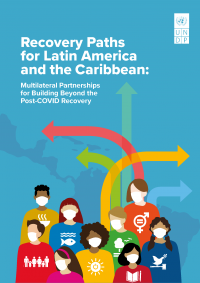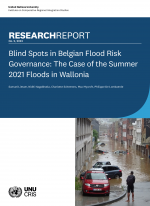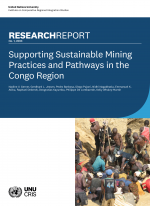Recovery Paths for Latin America and the Caribbean: Multilateral Partnerships for Building Beyond the Post-COVID Recovery

As one of the most vulnerable regions in the world, the effects of the COVID-19 pandemic were particularly amplified in the Latin America and the Caribbean (LAC) region. Health systems struggled to cope. The virus ran rampant throughout the region, leaving a disproportionate number of victims compared to other regions, and unveiling a range of structural weaknesses in the underresourced health sector, including financing, health information systems and service provision capacity.
As part of their efforts to minimize the spread of the virus, governments in the region-imposed lockdowns that halted local and international mobility, causing a range of grave economic and social effects that amplified existing vulnerabilities. The volume of exported goods decreased by 20 percent, while imports decreased by 25 percent. Estimates from the United Nations Economic Commission for Latin America and the Caribbean (ECLAC) and UNICEF predict a loss of 8.5 million jobs. Poverty in the region is expected to sharply increase between +4 percent and +7 percent, with children hit disproportionately hard.
Yet, as the processes of rebuilding and recovery begin to unfold, opportunities for structural change have appeared and could potentially lead to a more inclusive and sustainable economy. This would enable governments to overcome the COVID-induced setbacks in the progress made over the past decade in tackling poverty, inequality, employment, education, health and gender equality. To make sure recovery can take hold, the pandemic must first be brought under control in the region, followed by strategic investments in more resilient health services. To ensure a strong, sustainable economic recovery in the mid-term, there should be a move towards an integrated fiscal policy, instead of adopting restrictive fiscal expenditures and undermining trade, particularly intraregional trade. International partners, ranging from bilateral development assistance providers to multilateral financial institutions, have a key role to play in helping to tackle the deep structural issues afflicting the region and its economies. In addition to supporting health and humanitarian initiatives, they can contribute through debt relief, access to liquidity and lower future interest rates.
Addressing the social costs of COVID-19, such as increasing poverty and inequality in the region, requires the strengthening of social protection systems both in the short and medium term. This situation, added to the increasing levels of fiscal deficits, implies trade-offs between tax and social reforms, which require social and community consensus to reduce social unrest.
The health, social and economic pathways to recovery are best laid with strong cooperation, both between LAC and international partners, but also within LAC itself. Given similar COVID-19 - related development challenges in many countries, the fragmentation of the region into isolated national recovery plans must be prevented. Existing regional structures, from the Pan American Health Organization (PAHO) to the Caribbean Community (CARICOM), need to be fostered, while at the same time preventing duplications. In addition, ad hoc regional initiatives can be created to address specific policy fields. Multi-country programmes, where a sector-specific programme is rolled out in several countries after local adaptation, also offer great potential to benefit from synergies.
Complementary to or instead of reinforcing traditional bilateral partnerships, international partners should be encouraged to take a collective approach to the region to ensure the most inclusive and sustainable recovery for the entire area. Otherwise, parts of the LAC region risk being side-lined, thus endangering the recovery of the region at large. This is especially the case where national responses are insufficient, in particular in the areas of governance of infectious diseases, cross-border natural resources, people mobility, intraregional trade, regional value chains and regional infrastructures.



